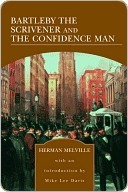What do you think?
Rate this book


368 pages, ebook
Published September 1, 2009
"Which animation, by the way, might seem more or less out of character in the man in gray, considering his unsprightly manner when first introduced, had he not already, in certain after colloquies, given proof, in some degree, of the fact, that, with certain natures, a soberly continent air at times, so far from arguing emptiness of stuff, is good proof it is there, and plenty of it, because unwasted, and may be used the more effectively, too, when opportunity offers."